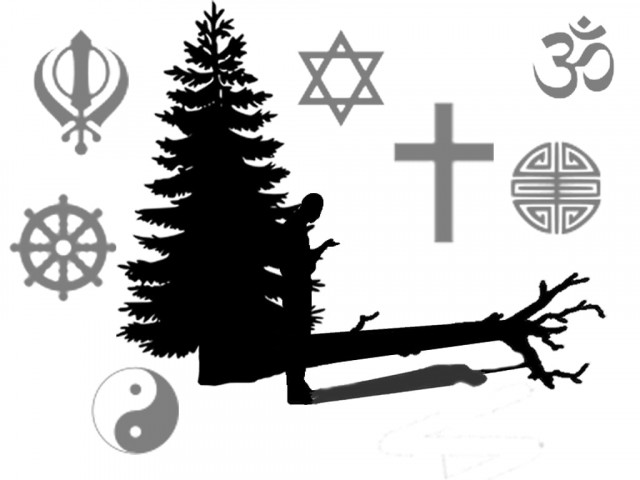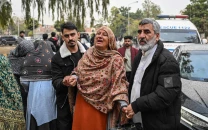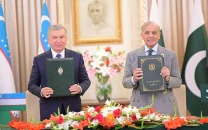Minority Rights Day: 2012 saw rise in attacks on places of worship
Weak prosecution of incidents reflects lack of political will, fear, lawyers say.

Minority Rights Day: 2012 saw rise in attacks on places of worship
Just this year, nine places of worship have been damaged, destroyed or vandalised in Pakistan. This includes five churches and three Hindu temples.
Part of a disturbing trend in violence against minorities in the country, at least 27 places of worship of religious minorities have been vandalised in the last four years, according to data collected by the Church-run National Commission of Justice and Peace. The NCJP also records incidents of forcefully occupying land meant for worship places or occupying existing places, as well as murders of those involved in building worship places.
This year, three churches in Sindh, one in Mardan and one in Faisalabad were attacked; one Hindu temple was vandalised, one razed in Karachi and another attacked in Peshawar, while minarets of an Ahmadi place of worship were demolished in Kharian, Punjab. The perpetrators in all of these cases were “unidentified men,” except for the Ahmadi worship place, where the minarets were demolished by the Punjab police.
Senior office bearer of the Human Rights Commission of Pakistan Hussain Naqi blames this increase in violence against minorities on a “mix of absence of good governance, connivance and fear” on the state’s part.
The country’s Constitution defends minorities, their access to worship, and their properties; more specifically, both Pakistan Penal Code and Muslim law protect all places of worship. However, prosecution is often weak when places of worship of minorities are attacked. “Minorities are discriminated against in such cases, largely because of weak investigation on the police’s part,” says senior advocate of the Supreme Court Mian Tariq Ahmed. Kamran Arif, lawyer and member of the HRCP agrees, “Nobody is interested in prosecution of such cases.”
Arif adds that, “the law for protection of minorities’ worship places, for example section 295 of the PPC, does have room for improvement, but the issue is that the government needs to work on implementation of whatever little the law offers, to tackle the issue of impunity.”
Most lawyers agree with this assessment. The issue is not of poor legislation but of poor implementation and lack of political will to stand for the rights of minorities. “Politicians are busy with the goal of gaining enough votes and probably fear plays a part in stopping them from taking a firm stance in the minorities’ favour,” says constitutional lawyer Salman Akram Raja.
Two members of the ruling party, former Punjab governor Salman Taseer and religious affairs minister Shahbaz Bhatti were both murdered for their stand on a blasphemy case. The state’s weak response to the murders of its own was widely criticized by rights groups. “Pakistani society has never stood up for a fundamental norm or rights collectively and such cases cannot just be fought in the courts,’” says Abid Hassan Minto, senior lawyer and constitution expert. Minto points out that judges also do not take decisions which would rile the status quo, partly due to fear.

Naeem Shakir, an advocate who has represented Christian victims of violence in Punjab, believes judges give verdicts that do not provide justice and lawyers take up cases against religious minorities because they believe “their status in heaven will be raised by such stances in court”.
“Only a particular brand of Muslim is considered a citizen with full rights,” says Raza Rumi, director of the Jinnah Institute, a public policy think tank that also focuses on minority rights and discrimination in society. Rumi adds that the problem lies in society’s attitudes toward minorities. “Law enforcement apparatus is also staffed with people of the same society, whose interface with Pakistan’s educational system and the “values”, indoctrinates them with identical prejudices.
Of late, the law enforcement agencies are weaker and vulnerable to organised militant groups, who infiltrate themselves in the mobs who attack worship places of the religious minorities, and when faced by a powerful adversary, the police also stop resisting the mob.” He stresses that the general public is indifferent to such crimes against the minorities because they simply do not know how to react, and because their identity is premised on Islam.
Organised attacks on minorities can only be dealt with, if Pakistan has a law on “violence against minorities”, just like there is legislation on violence against women. “It is the only way forward,” says Peter Jacob, Director of NCJP. He stresses the need to also “define crimes against minorities so that such incidents can be dealt with as per law.” Jacob says that the posturing of law needs to be proactive, and the government’s efforts to mainstream non-Muslim citizens needs to reach a logical end.
Published in The Express Tribune, December 18th, 2012.



















COMMENTS
Comments are moderated and generally will be posted if they are on-topic and not abusive.
For more information, please see our Comments FAQ